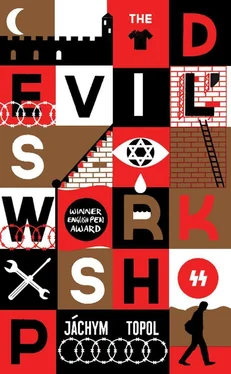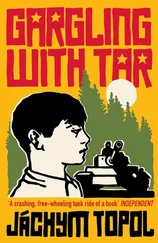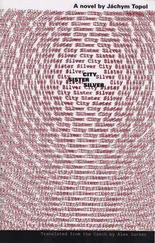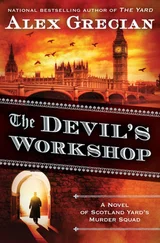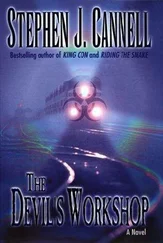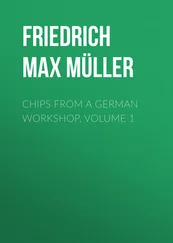My aunts, among the few original inhabitants who had stayed, since they had nowhere to go, were now little old ladies, and the handful of other people stumbling towards us over the bricks and rocks and beams littering the ground, hair sticking out every which way, looked like castaways. They welcomed me back as a local son — old gents, old maids, and a couple of ghostly older men, mental cases and cripples who used to be soldiers. Now they were disabled and lived, literally, in holes in the ground.
The brick walls of Terezín’s underground tunnels were caving in, black groundwater lapped everywhere. The massive gates, designed to withstand Prussian cannons, were crumbling bit by bit. Nobody weeded the grass on the ramparts any more.
The goats? Mine had either all died or were so old I didn’t recognize them, except for a couple of young females and a single little billy goat, Bojek, headstrong, punch-drunk, and now nearly blind. I think he used to snuggle up to my scabby knees when I was a boy. I hadn’t forgotten that long-ago affection.
I made note of people’s warnings that the mental cases were stealing, eating, or selling the goats. I took up my duties with the flock as soon as I was settled in.
Lebo and Mr Hamáček brought me to one of the buildings on Central Square that they’d taken over and turned into the centre of the crumbling town.
They lived in a room filled with old bunk beds made out of planks, I was told Lebo’s illegal birth had taken place on one of them.
The Monument had been planning to build an office here, but the stubborn residents had blocked it.
On one of the bunks I tossed a plastic bag with a toothbrush and a half-empty tube of toothpaste, that was all I had.
My aunts gave me a facecloth, a sweater, some socks and a few other belongings from the people who had left, and I had a home.
The building, which soon came to be known as the Comenium, was a squat. Lebo had occupied it along with a few other people whose homes had been demolished, just like my family’s had. It served as a clubhouse for the stubborn residents who had decided to stay in town. Or had no choice but to stay, since nobody wanted them anywhere else.
Aunt Fridrich still operated her laundry, and on the ground floor she and the other aunts had brought in cookers, pans, pots and so on, and set up a cookshop.
Nothing fancy — after all those canteens of clamouring men and clubs for officers like my dad, it was a pitiful place. But you could almost always get a bowl of soup or cup of tea.
The scholars and eggheads and board members didn’t come here. They stayed in the Monument, tending to their state-funded trails that highlighted the wartime horrors, running their fingers over maps of the disappearing town hand in hand with the government engineers, carving out the lines of destruction.
Lebo had broken with the board members and scholars. At first they ridiculed him for his demand that not a single brick should disappear from the town, not even in the modern era, as he put it. Of course they did it behind his back, when no one was around. Lebo had been born in Terezín during the war, and that fact alone froze the blood in a lot of people’s veins, so it wouldn’t have been fitting for the researchers and board members to mock him to his bony face.
At first the researchers called in some of the people who’d passed through Terezín as prisoners, and a lot of them said: It’s about time, this whole town of death and humiliation can go to hell! Take this train station, where hundreds of thousands went east and never came back, and wipe it right off the map! It should only exist in textbooks!
But others were of a different opinion, and as one debate led to another the bricks continued to crumble.
Until the government, advised by the researchers and board members, came to a decision.
The Monument would be preserved, but not the town. There wasn’t money for it.
Lebo stayed out of the arguments and withdrew from the Monument. He had been hardened in Terezín as a baby, and as far as time was concerned he had a clear advantage over the older prisoners. He didn’t want to squander it debating.
Old homes. Broken cobblestones. Trickles of dirty water flowing from cracked sewer pipes. Collapsing barracks filled with cats and pigeons’ nests. The whole derelict town surrounding the Monument.
They didn’t want us there. We got in the way of the bulldozers. It was easy for them to round up a few unsuspecting mental cases and stick them in the nuthouse, hoodwink a couple of grannies and grandpas, nod them in the direction of some blocks of flats and watch all trace of them vanish from the world.
But we were the last inhabitants and we weren’t giving up.
Most of us moved into the building on Central Square.
The people from the Monument never liked Lebo. But compared to how much they hated him later, when we joined forces with the world and Lebo became the Guardian of Terezín, it was nothing.
The first few days I just sort of straggled around the sad town, reinforcing my heartache. Lebo left me alone.
But soon I realized: I was now the only one who called Lebo ‘uncle’.
All my fellow pupils, everyone from that bunch of kids who crawled through the catacombs under Lebo’s guidance, wading through underground streams looking for objects from his days as a child, was scattered around the world. Everybody who could had left the town.
That evening I stood on the crumbling ramparts alone, gazing out at the tall grass that hadn’t been properly grazed for years, and thought about Terezín.
I drove the little goats into their shed and fastened the shaky door with a chain as a warning, a sign saying, I’m here now, I’m back, look out! I didn’t want the mental cases killing and eating any more goats. The main ones I had my eye on were Kamínek and Kůs. I’m sure those bums would’ve been glad to drag their prey off into some cellar, their homeless berths stuffed with blankets and rags. Yes, my herd had been sold, killed off and plundered just like the town. Old billy goat Bojek, once a head-butting monster, now just limped along. Don’t worry, Bojek, I promised him, I won’t give you up.
Where is everyone? I asked the silent battlements.
And suddenly I realized I was standing on the spot where my dad had fallen from the ramparts.
It’s like there was never even anyone here, isn’t it?
Lebo. He had followed me. His black suit blended in with the gloomy mass of the night horizon. Only his eyes shone in his enormous skull.
You know, your father wouldn’t have agreed to end Terezín either. He was devoted to this town. It was right here somewhere — Lebo waved his hand towards a dusky patch of red grass beneath us — that he pulled your mother out of the grave.
Grave, well, Lebo said, pausing a moment to swallow. It was a pit. I was little, so I don’t remember, but they say there were pits everywhere.
What? I said. I didn’t know anything about this chapter of their lives.
That’s right, he pulled her out, Lebo said. And there, as night fell over the ramparts, Lebo told me the story my dad had told him once upon a time.
They were run ragged, all those Soviet troops and liberators of Terezín, when their formations came through Manege Gate to Central Square. There was typhus here, you know. They couldn’t even drink the water. Plenty of them had vodka in their canteens, but not your dad, he was just a boy, and that army drum weighed him down something awful.
And right here — Lebo gestured with his right hand — he came to lie down right here, set his drum down on the grass by the pits, and all of a sudden he looks! What’s that moving around in there? A naked girl, sitting on top of a pile of corpses, an absolute skeleton, and she’s waving to him. So he tears his strap off his drum, throws one end to her and pulls her out of the pit. She was Czech, he realized from the words rasping from her parched and blistered lips, which for him, being a Czech boy, was cause for celebration. In all those battles and offensives as the Red Army dashed to the aid of Prague, he just banged his drum, you understand, he wasn’t in a position to talk to any civilians.
Читать дальше
